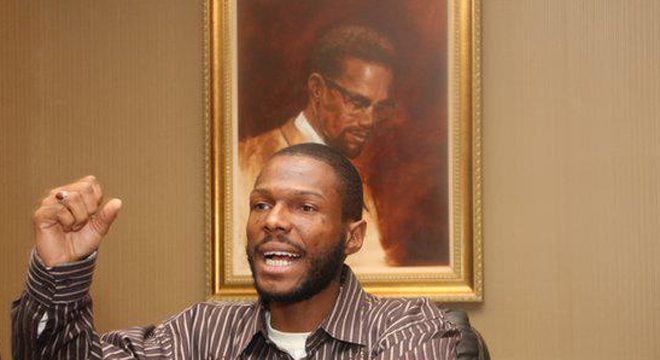Malcolm Shabazz, the grandson of the late civil rights leader Malcolm X, has died while in Mexico. The news first broke when a family friend named Terrie Williams announced his death on Facebook and Twitter. TPM has independently confirmed his death through another source with close knowledge of the situation. According to an associate, Shabazz was beaten during a robbery Wednesday night in Mexico City.
Like his namesake, Shabazz, who was 28, was actively engaged in politics. Juan Ruiz, a member of the California-based labor organization Rumec, told TPM Shabazz was in Mexico City with one of the group’s leaders, Miguel Suarez who had been deported from the United States last month.
“He’s a supporter of our organization” said Ruiz. “He went to Mexico to meet with Miguel.”
A posting made Wednesday evening on Rumec’s Facebook page said Shabazz was in Mexico City with Suarez and wanted to share their story with local media.
Multiple members of Shabazz’s family did not respond to a request for comment from TPM. Officials with the State Department would not confirm Shabazz’s death.
“We are aware of the death of a U.S. citizen in Mexico City. We have been in contact with family members, and at their request we have no further comment at this time,” a State Department spokesperson said in response to an inquiry about Shabazz.
According to Ruiz, Shabazz died after being beaten during a robbery. Though Ruiz is currently in the United States, he said he had been in communication with Suarez who was with Shabazz at the time of his death.
“He was murdered. He was in Mexico City and I believe they attempted to rob him and he didnt allow it, so they beat him to death and he died on his way to the hospital,” said Ruiz. “This is all I can confirm, everything else is under investigation for the meantime.”
Shabazz had a troubled youth. He moved between France, California, and New York with his mother, Qubilah. In 1995, Qubilah was charged with planning to kill Nation of Islam leader Louis Farrakhan with her boyfriend, who was an FBI informant. She was allegedly motivated by a belief Farrakhan was involved in Malcolm X’s 1965 assassination. The charges were subsequently dropped with support from Farrakhan and Qubilah agreeing to undergo psychiatric and substance-abuse treatment. In a 2010 interview with this reporter, Qubilah said she did discuss killing Farrakhan with her boyfriend, but “it was a joke.”
In 1997, when he was 12-years-old, Shabazz was living with his grandmother, Betty Shabazz when there was a fire in her home. Betty subsequently died as a result of injuries sustained in the blaze. Shabazz plead guilty to setting the fire and was sentenced to 18 months in a juvenile facility with possible extensions. During his trial, Shabazz was described in psychiatric testimony as a paranoid schizophrenic with psychotic episodes.
Shabazz was released after four years. In an interview with the New York Times he admitted to setting the fire and said he did so because he wanted to be sent back to live with Qubilah. In a 2011 conversation with the Amsterdam News, Shabazz would not discuss the fire that killed his grandmother and implied he was not responsible.
“I was coerced,” said Shabazz, who added that he was working on a book about his life.
After being released from juvenile detention, Shabazz became involved with the Bloods street gang. In 2002, he was arrested for allegedly robbing a man after a party. Shabazz was convicted of attempted robbery and spent several years in prison.
In 2011, Shabazz told the Amsterdam News he was working on a book. He also said he believed his family was being persecuted “by select businessman and government officials.”
“I’ve been a target my entire life. My family is targeted,” he said.
Last month, the Iranian state-owned news outlet Press TV published a lengthy statement attributed to Shabazz in which he claimed he was being harassed by the FBI and police in upstate New York due to time he spent in Syria and his attempts to travel to Iran. Shabazz had appeared on Iranian television in April 2012. In the statement published by Press TV, Shabazz accused multiple U.S. government agencies of having “set the climate for my grandfather’s assassination, and made my family a long-suffering casualty of COINTELPRO, and other anti-Black repression programs.”






